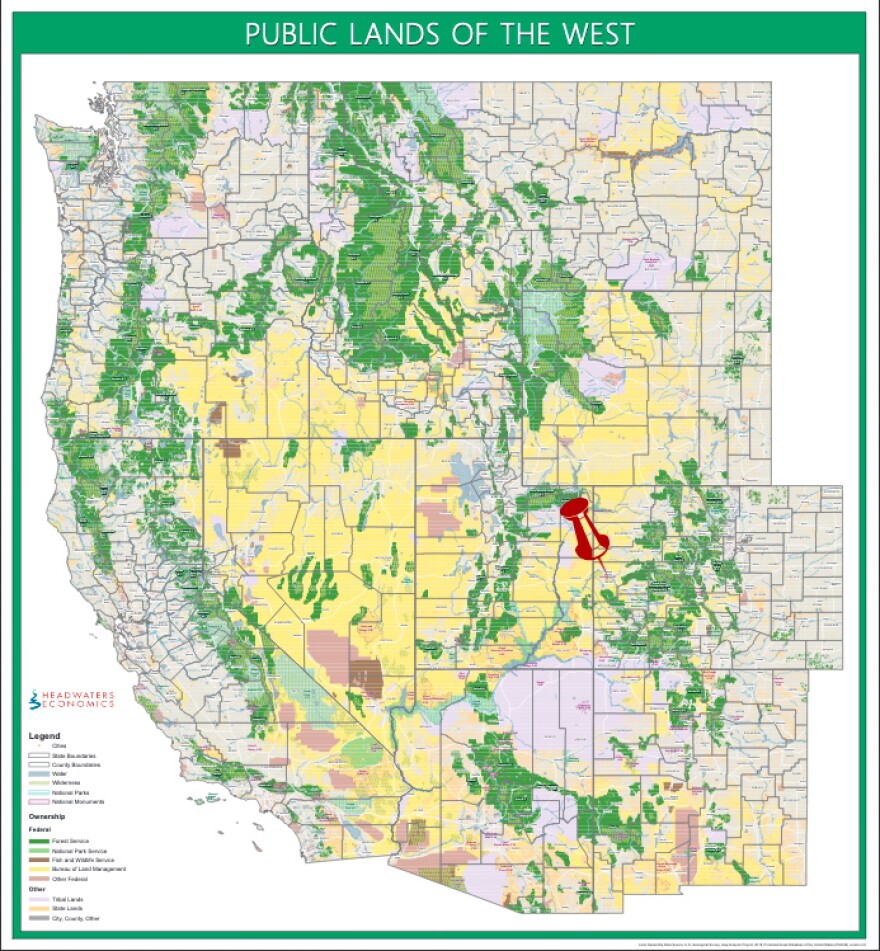The Bureau of Land Management is moving more staff and鈥攑erhaps most significantly鈥攊ts headquarters to the Mountain West.
Depending on who you ask, relocating the BLM鈥檚 headquarters from Washington, D.C. to Grand Junction, Colorado will make the agency more efficient, give preferential treatment to the fossil fuel industry鈥攐r even .
By the end of next year, will likely move to the idyllic town halfway between Denver and Salt Lake City. And hundreds more will be scattered across the West.
Grand Junction Mayor Rick Taggart says the shake-up will give his city a stronger political voice.
鈥淎s a smaller city in western Colorado, we鈥檙e not as well-known,鈥� Taggart said. 鈥淎nd because of that sometimes, we don鈥檛 have the voice even in our state government that we鈥檇 like to have.鈥�
But it鈥檚 not just local voices expected to be amplified.
Jeremy Gelman, an assistant professor of political science at the University of Nevada, Reno, where he studies Congressional partisanship and agenda-setting, says industry also stands to benefit.
鈥淚n the case of the BLM, mining interests, logging companies, farmers, ranchers, their locus of power鈥攖heir epicenter of where most of their people are鈥攊s out West,鈥� Gelman said. 鈥淎nd Republicans want those folks [to have] easy access to BLM when regulations are being written.鈥�
And some of those folks will be close, very close.
The Grand Junction headquarters will be in the same building as a corporate office for Chevron, a , and Laramie Energy, an oil and gas producer. In a statement, a BLM spokesperson said any suggestion that the location was chosen to give select special interest groups unethical access is 鈥渇lagrant and ironic.鈥�

Gelman says it鈥檚 hard to know the intentions behind the decision, but overall, he says there鈥檚 no doubt the move will make it easier for industry interests to access BLM bureaucrats鈥攁nd harder for national environmental groups who employ lobbyists in Washington.
鈥淔or really big stuff, you鈥檙e going to expect all the big players to show up,鈥� Gelman said. 鈥淏ut for the smaller day-to-day stuff鈥攚ho you鈥檙e hearing from, what鈥檚 important, what鈥檚 not important鈥攖hat sort of access does matter. It鈥檚 not everything, but it does sort of tilt the playing field a little bit to who can get that face-to-face time.鈥�
That鈥檚 a selling point for Utah Congressman Rob Bishop, the ranking Republican on the . He says moving the BLM to the West puts agents closer to the lands they manage and local interests.
鈥淗aving people on the ground who have the ability of making the final decision, not just having a job there locally, but also having the ability of making those decisions, that鈥檚 going to be a net plus. That鈥檚 going to benefit people,鈥� Bishop said.
But it doesn鈥檛 appear that some BLM staffers stand to benefit. Many agency employees have expressed frustration over the move. As ProPublica recently , 11 BLM employees have already quit, with more resignations expected, despite a .
That has some Democrats and environmental groups worried, saying that losing these seasoned staffers could further strengthen the influence of the oil and gas industry. Bishop doesn鈥檛 buy that.
鈥淲hy could simply the gas and oil industry have more influence than, say, an environmental group that鈥檚 out there, or a cattle ranger that鈥檚 out there?鈥� Bishop said, calling it 鈥渁n argument you come up with to try and find some reason to stop a logical move from going forward.鈥�
Arizona Democrat Raul Grijalva, chairman of the House Natural Resources Committee, can鈥檛 see the logic.
鈥淭he rationale for it is hard to figure out,鈥� he said. 鈥淚n fact, I don鈥檛 think there is one鈥濃€攐ther than, he added, 鈥渕aking sure that...the fossil fuel industry is taken care of above anything else.鈥�
Grijalva says his committee hasn鈥檛 been given enough information on the types of jobs moving West, and he鈥檚 concerned about decision-making positions being so far away from Congress.
鈥淭he last thing you want is little fiefdoms in each state making their own decisions and doing their own procedures,鈥� Grijalva said. 鈥淎nd I think that鈥檚 part of the intention鈥攖o allow a state that is all for extraction and nothing else to have the freedom to do that without any oversight by the federal government to the law and to other requirements.鈥�
Grijalva says he鈥檚 prepared to issue subpoenas if the committee doesn鈥檛 get the information it鈥檚 looking for.
The House and Senate have both refused to provide funding for the move in the latest budget. But a Department of Interior spokesperson says the relocation is moving forward using funding previously approved by Congress.
This story was produced by the Mountain West News Bureau, a collaboration between Wyoming Public Media, Boise State Public Radio in Idaho, KUER in Salt Lake City, KUNR in Nevada and KRCC and 皇冠网址 in Colorado.
The public lands map used in this story comes from .
Copyright 2020 KUNR Public Radio. To see more, visit . 9(MDAxNDQ2NDAxMDEyNzU2NzM2ODA3ZGI1ZA001))






